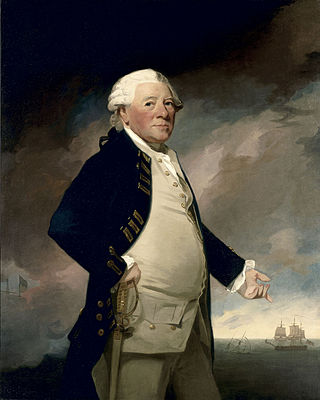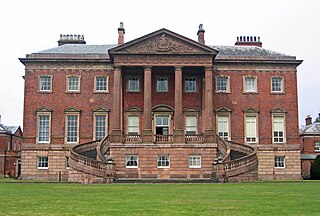
Earl of Chichester is a title that has been created three times, twice in the Peerage of England and once in the Peerage of the United Kingdom. The current title was created in the Peerage of the United Kingdom in 1801 for Thomas Pelham, 2nd Baron Pelham of Stanmer.

Earl Granville is a title that has been created twice, once in the Peerage of Great Britain and once in the Peerage of the United Kingdom. It is now held by members of the Leveson-Gower family.

There have been three baronetcies created for persons with the surname Booth, one in the Baronetage of England and two in the Baronetage of the United Kingdom. The 1916 creation remains extant, the 1835 creation became extinct in 1896 and the 1611 baronetcy has been dormant since 1797. The senior line of the first creation was elevated to the peerage as Baron Delamer and Earl of Warrington.

There have been seven baronetcies created for members of the Lowther family, one in the Baronetage of Nova Scotia, two in the Baronetage of England, two in the Baronetage of Great Britain and two in the Baronetage of the United Kingdom. Two of the creations are extant as of 2008.

Baron Carteret is a title that has been created twice in British history, once in the Peerage of England and once in the Peerage of Great Britain. The first creation came into the Peerage of England in 1681 when the fourteen-year-old Sir George Carteret, 2nd Baronet, was made Baron Carteret, of Hawnes in the County of Bedford. The peerage was originally proposed for his grandfather Sir George Carteret, 1st Baronet, a celebrated royalist statesman, but he died before he was granted the title and as his eldest son, Philip, predeceased him, it was eventually bestowed on his grandson, George, with remainder to the latter's brothers. The Baronetcy, of Metesches in the Island of Jersey, had been created for George Carteret in the Baronetage of England on 9 May 1645. Lord Carteret married Lady Grace Granville, daughter of John Granville, 1st Earl of Bath. In 1715 Lady Grace was raised to the Peerage of Great Britain in her own right as Viscountess Carteret and Countess Granville. Lord Carteret and Lady Granville were both succeeded by their son John Carteret, the second Baron and second Earl. The titles became extinct on the death of the latter's son Robert Carteret, the third Earl, in 1776.
There have been ten baronetcies created for persons with the surname Browne, six in the Baronetage of Great Britain, three in the Baronetage of Ireland and one in the Baronetage of Nova Scotia. Only one creation is extant as of 2010. Three of the creations were for members of the Browne family headed by the Viscount Montagu.

There have been three baronetcies created for members of the Grey family, one in the Baronetage of England, one in the Baronetage of Great Britain and one in the Baronetage of the United Kingdom. Two of the creations are extant as of 2007.
Nineteen baronetcies have been created for persons with the surname Hamilton, eight in the Baronetage of Nova Scotia, one in the Baronetage of England, five in the Baronetage of Ireland, one in the Baronetage of Great Britain and four in the Baronetage of the United Kingdom. As of 2008 two creations are extant, two are dormant, two are either extinct or dormant and twelve extinct.

There have been two baronetcies created for persons with the surname Aston, both in the Baronetage of England. Both creations are extinct.

There have been two baronetcies created for people with the surname Tollemache, or Talmash, one in the Baronetage of England and one in the Baronetage of Great Britain.

There have been seven baronetcies created for persons with the surname Parker, three in the Baronetage of England, two in the Baronetage of Great Britain and two in the Baronetage of the United Kingdom. Two of the creations are extant as of 2008. Though none of the different families of baronets were related, several supplied a number of flag officers to the Royal Navy.

There have been twenty one baronetcies created for persons with the surname Williams, eight in the Baronetage of England, three in the Baronetage of Great Britain and ten in the Baronetage of the United Kingdom. Only six of the creations are extant as of 2017.
There have been four baronetcies created for people with the surname Parsons, two in the Baronetage of Ireland, one in the Baronetage of England and one in the Baronetage of the United Kingdom. One creation is still extant as of 2008.
There have been three baronetcies created with the surname Shirley, two in the Baronetage of England and one in the Baronetage of Great Britain. Only the first creation remains extant as of 2016.

There have been two baronetcies created for persons with the surname Goring, both in the Baronetage of England. The second creation came into the family through a special remainder in the patent creating the baronetcy. Only the latter creation is extant as of 2008.

There have been three baronetcies created for persons with the surname Carew, two in the Baronetage of England prior to 1707, one in the Baronetage of Great Britain.

There have been seven baronetcies created for persons with the surname Herbert, three in the Baronetage of England, one in the Baronetage of Ireland and three in the Baronetage of the United Kingdom. All creations are extinct.

There have been two baronetcies created for persons with the surname Leicester, both in the Baronetage of England. The fifth Baronet of the second creation was raised to the peerage as Baron de Tabley in 1826. Both the barony and the two baronetcies are now extinct.

The de Carteret family was perhaps the greatest of the patrician families of the Channel Islands. Their influence on the Island would last from the 10th century until the present time.
Carteret is a surname of Norman origin. It derives from Carteret, Normandy, an inhabited place on the northwest coast of the Cotentin peninsula, facing the Channel Islands. The Channel Islands are the only remnant of the Duchy of Normandy, the original territorial holding of William the Conqueror, who invaded England in 1066. Historically, members of the Carteret family have occupied influential positions in the Channel Islands, notably as hereditary Seigneurs of Sark and hereditary Bailiffs of Jersey.













